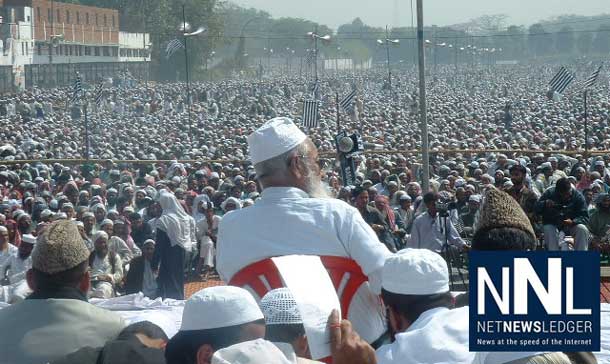
Over 100,000 Muslims Take Pledge of Peace and Inter-religious Harmony
NEW DELHI – Inernational News – The World Peace Conference seeks to highlight the role and duties of the Ulama, in the larger context of establishing national peace and harmonious relations with the community, with an Islamic perspective to address issues like communal conflict between religions and various Muslim theological groups, and social evils like sexual exploitation, alcoholism, and drugs.
Rallying Muslims from all walks of life to practice peace, harmony and brotherhood not only among Muslims, but also other religions, speakers at the event presented perspectives and insights from the Quran’s message of protecting the innocent and ending societal injustice. Taking a strong stance against terrorism, the speakers unanimously spoke against the misuse of Islamic ideology by terrorism and Islam’s dedication to peace.
In their first large scale initiative in the capital, leading Islamic organization Jamiat Ulama l-Hind organized a gathering of over 100,000 Muslims to pledge towards peace and harmony among different religions, communities and Muslim theological groups. Through an ‘Aman Ka Pegam’ (Message of Peace), Jamiat Ulama I-Hind brought the collective vision of Ulemas across the world to end religious conflict and oppression of minorities.
Prominent Muslim scholars spoke at the event, including Maulana Mahmood A Madani (General Secretary, Jamiat Ulama-I-Hind), Maulana Fazlur Rahman (President, Jamiat-ul-Ulema-e-Islam, Pakistan), and Qari Usman Mansoor Puri (Jamiat Ulama-i-Hind President), Mufti Mohammad Rizwe (Sri Lanka) and Mufti Noor Mohammad (Burma).
Announcing the World Peace Forum as a result of the discussion and deliberation undertaken at the World Peace Conference, leading Islamic scholar and politician Malauna Mahmood A Madani, General Secretary, Ulama-I-Hind said: “The World Peace Forum has brought together the Maldives, Pakistan, Bangladesh, Myanmar, Sri Lanka, The United Kingdom, Nepal and the United States to work in tandem towards mitigating terror. The Forum will see Islamic organisations across the world create and establish critical initiatives against terrorism of all kinds, and assist each other towards this common purpose. We are responsible for establishing the environment of peace, and must move forward among our communities to implement this declaration of peace, fight against injustice and oppression. We want to create a world where there is no injustice and bloodshed.”
Maulana Mahmood A Madani also announced the resolutions undertaken at the World Peace Conference through a formal Declaration:
While commemorating the unparalleled sacrifice and contribution of Shekhul-Hind-Maulana Mahmood Hasan Deobandi, his associates and all the fighters for the freedom of Indian sub continent, this conference of prominent Ulema, theologians and leaders from India and abroad, taking inspiration from Shaikhul Hind, proclaims its commitment:
1 – We shall continue to cooperate with each other to facilitate establishment of friendly relations at all levels, re-conciliation and peace for the benefit and well being of entire humanity.
2 – While safeguarding our countries’ integrity and honour, we will work at all levels for the prosperity and welfare of each other.
3 – We will mobilize people and make effort to solve conflicts through peaceful means.
4 – Islam holds chaos and disorder of all kinds, disharmony, bloodshed and targeting of innocent people as most heinous crime. Therefore, we condemn vociferously all kinds of terrorism. In this respect, we fully endorse the fatwa of Darul Uloom Deoband. We appeal to all the justice loving people that they should not only denounce terrorism but also try to remove the causes and motives that breed terrorism.
5 – No country or society can progress, prosper or enjoy peace unless the rights of minorities, poor people, weaker sections and women are safeguarded. Therefore, we will strive utmost to deliver them their rights and social justice.
6 – For cleansing the society of crimes, immoral customs, extravagance, alcoholism, drug addiction, sexual exploitation, nudity and female foeticide we invite the leaders of all the faiths and reformative organizations for co-operation and joint action.
7 – We declare that sectarian violence and bloodshed is totally anti Islam. We condemn it and undertake that we will perform our role to stop sectarian violence.
8 – Taking inspiration from the most esteemed address of Shaikhul Hind delivered while laying the foundation of Jamia Millia Islamia, we consider it our duty that we try utmost to remove ignorance both temporal and religious. In order to take the lifetime mission of Maulana Asad Madani Ex-president of Jamiat Ulama-I-Hind forward, we will take action to establish institutions to impart modern education in Islamic environment.
9 – We also undertake to lend our support to all righteous religious institution and movements.
Organized by the Sheikh-Hind Charitable Trust, the World Peace Conference concluded with international Islamic scholars and clerics from The Maldives, Pakistan, Bangladesh, Myanmar, Sri Lanka, The United Kingdom, Nepal and the United States giving unanimous support to a fatwa against terrorism in conclusion to the World Peace Conference. The fatwa declares Islam’s vision to end terrorism with a message of global peace, and is a significant step towards promoting Islam’s belief that terrorism should be eradicated.
About the World Peace Conference
The World Peace Conference seeks to highlight the role and duties of the Ulama, in the larger context of establishing national peace and harmonious relations with the community, with an Islamic perspective to address issues like communal conflict between religions and various Muslim theological groups, and social evils like sexual exploitation, alcoholism, and drugs.
About Jamiat Ulama-I-Hind
Jamiat Ulama-I-Hind is among India’s leading Islamic organizations in India. Founded in 1919 by leading Muslim scholars, the organisation’s network spans across India. Jamiat Ulama-I-Hind works to promote a nationalistic philosophy, secularism and Muslim welfare.
